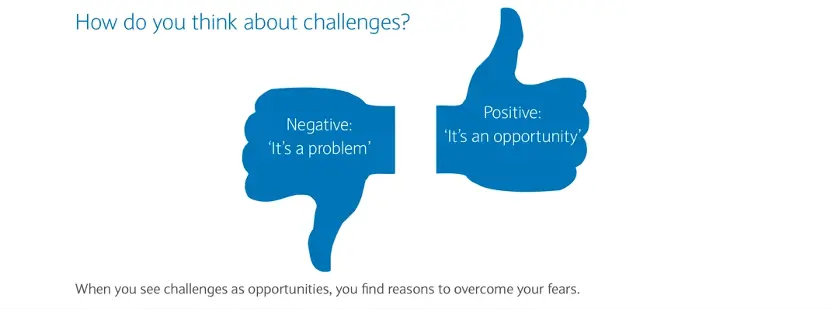Taking on new challenges




Developing self-confidence is really important for young people as they begin to make the journey to adulthood. It can help them when speaking to people older than them or in more senior positions, and it can help them face challenges with confidence.
We’ve included useful pointers so you can complete these activities with your child, or they can complete them independently using the worksheets provided.
Tackling challenges with confidence
Start by asking your child if they can recall a time when they’ve faced a problem or challenge. This could be something like starting a new school or competing in a sporting event.
Get them to write down any emotions they think someone might feel when faced with a problem or challenge, like the one they experienced. For example someone might feel frustrated, nervous or scared. What emotions might a person who has solved the problem experience? For example, relief or feeling proud. When we face a challenge that has a successful outcome, we often feel more confident afterwards.
You could share a challenge you have experienced and the emotions you felt.
Explain that there are two sides to a challenge: the fear of taking it on and the benefits of doing it. 
Below are quotes from three famous people. You may have other examples you can share of people they look up to such as a sports player or artist.
These three people showed resilience when facing challenges to achieve their goals, and demonstrate skills like resilience that can help turn negative situations into positive ones.
Dealing with a workplace challenge
It won’t be long until your child enters the world of work and has to deal with challenging situations, whether that’s part-time or full-time work. Encourage them to have a go at one of our workplace scenarios below and consider how the person might feel about the challenge. How would they respond?

· What might the person be worried about? Maybe they don’t want to make a mistake, or are concerned that the task taking a long time
· How could the challenge become an opportunity? Could it be a chance to learn a new skill or get to know a colleague better by asking them for support?
· What skills are needed to tackle the challenge? For example teamwork, honesty or creativity
We’ve got lots of top tips that your child can apply to challenges they may experience as they progress through school, college or university.
Tips for overcoming fears and tackling challenges:
1. Treat each challenge as an opportunity
2. Find reasons to try something new
3. Go out of your comfort zone
4. Have a goal and make a plan for how to reach it
5. Imagine what success looks like
6. Believe in yourself, your abilities and your potential
7. Realise why your fears might not be realistic
8. Ask yourself ‘What’s the worst that can happen?’
9. Learn from mistakes and then try again
The main takeaway from this activity is that your child understands how to develop and grow as a person, and that it’s important to take on new challenges. Remind them that it’s normal to feel scared – this shows you’ve taken on something worth doing and that you care about the outcome. It’s almost never as scary as it seems.


